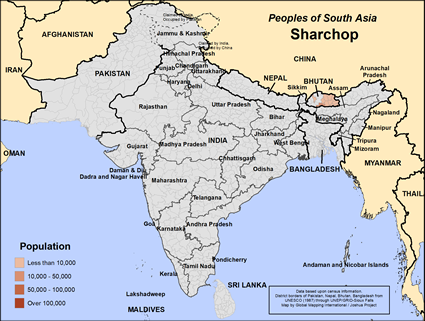Sharchop in Bhutan

Photo Source:
Anonymous
|

Map Source:
People Group data: Omid. Map geography: UNESCO / GMI. Map Design: Joshua Project.
|
| People Name: | Sharchop |
| Country: | Bhutan |
| 10/40 Window: | Yes |
| Population: | 68,000 |
| World Population: | 68,000 |
| Primary Language: | Tshangla |
| Primary Religion: | Buddhism |
| Christian Adherents: | 0.15 % |
| Evangelicals: | 0.15 % |
| Scripture: | New Testament |
| Ministry Resources: | Yes |
| Jesus Film: | Yes |
| Audio Recordings: | Yes |
| People Cluster: | South Asia Buddhist |
| Affinity Bloc: | South Asian Peoples |
| Progress Level: |
|
Introduction / History
Wedged between the Himalayas of India, Tibet and China is the world's only Buddhist kingdom, the country of Bhutan. The Sharchop live in this tiny country, which is also known as the "Land of the Thunder Dragon," due to the violent Himalayan thunderstorms. The Sharchop live in southeastern Bhutan, south of Tashigang, in the thick forests where there is less rainfall than the rest of the country.
The Sharchop are part of the Tibeto-Burman culture that influenced Bhutan from the east. They refer to themselves as Bhutanese and are racially Mongoloid, like the northern Bhutanese. However, their distinctive cultural traits clearly link them with the peoples of Tibet, Myanmar and Yunnan, China. Bhutan depends heavily on India for assistance and foreign trade. With new roads being built between Bhutan and India, many Sharchop are learning to speak Assamese and Hindi, as they come into closer contact with the people of India. Their heart language is Tshangla.
What Are Their Lives Like?
The Sharchop are part of an agricultural society and often use a "slash and burn" method of farming. Since dense plant growth limits the use of land for agricultural purposes, they clear the land by burning the vegetation. They grow dry rice on it for three or four years, then abandon it when the soil is exhausted. Since the government banned this farming method in 1969, more of them are settling in one place, often clearing new settlements in the forests.
Sharchop houses are made of stone and wood and are usually built on stilts in dispersed settlements along the mountain slopes. Larger settlements have monasteries called dzongs, where prayer flags and prayer wheels are a common sight.
A local variety of cattle known as mithun is a valued form of wealth and is sacrificed at religious ceremonies. Pigs and goats are also raised to sell and to use as sacrifices.
Water pollution is one of the most significant environmental problems in Bhutan; most of the rural population does not have a pure water supply. If good water is scarce in a settlement, water from a nearby spring or stream is piped in through bamboo conduits.
Because of the difficult mountainous terrain, many remote areas can expect a long wait for power.
What Are Their Beliefs?
Tibetan Buddhism exercises considerable influence in Bhutan. The Sharchop have also retained their own popular beliefs and practices.
As in Tibet, sacred inscriptions are written on prayer flags and planted near each house, and prayer wheels containing sacred syllables are kept in continuous motion as the Sharchop walk or rest. Illness is always believed to be caused by the devil or spirits. Lamas (spiritual leaders) read from the Buddhist scriptures to expel them.
In addition, elements of shamanism (the belief that there is an unseen world of many gods, demons, and ancestral spirits) are reflected in magical ceremonies. Omens and demons are believed to have direct influence on life. Every village has its shibdag, or "god of the soil," which must constantly be appeased, and each house has its god, tab-lha, who must not be offended.
What Are Their Needs?
From the central government to the local level, the gospel is not welcome in Bhutan. Christian resources will be very difficult to get into local villages in this mountainous country.
Prayer Points
Ask the Lord of the harvest to send out loving laborers to Bhutan.
Ask God to raise up prayer teams who will break up the soil through worship and intercession.
Pray for oral evangelistic materials to become easily available in Sharcrop villages.
Ask the Lord to raise Sharchop disciples who will make more disciples.